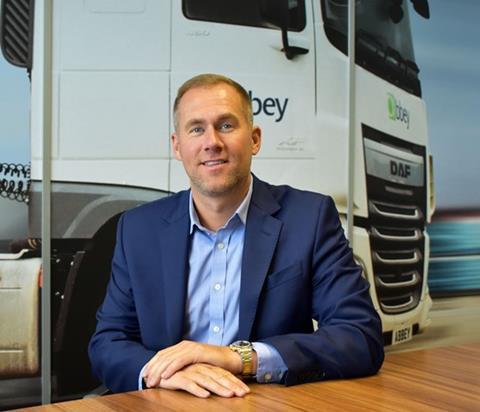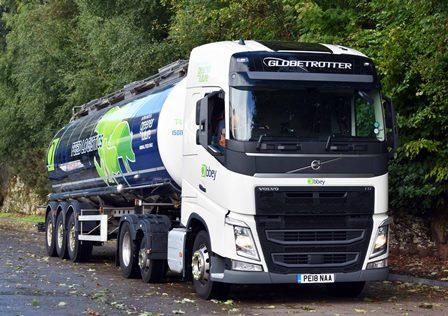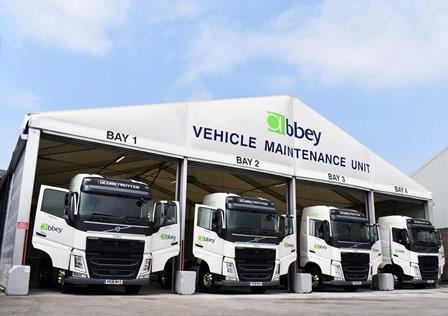
After leading a management buyout in 2016, and acquiring Armet Logistics and selling the general haulage business in 2017, Abbey Logistics chief executive Steve Granite says the company is now set for the next phase in its development plan.
Twice a winner of the Motor Transport Haulier of the Year, Abbey Road Tanks was founded in Birkenhead in 1973 by Charlie Lucy and his sons Charles, Steve and the late Mark. It took on a second larger site with its first tank wash facility in Bootle in 1992, generally regarded as the foundation of the modern-day Abbey Logistics Group.
Abbey is now 75% owned by Manchester private equity investor NorthEdge Capital, with the management team made up of Granite, chief operating officer Chris Chambers, commercial director Dave Coulson and financial controller Paul Jamieson holding the rest of shares.
“When Steve Lucy stepped down as MD in 2009 the intention was for me to take over and for him to sell the business in the near future,” says Granite. “But Abbey did better than expected so the Lucy family kept hold of it for longer and in 2016 I said to him ‘Abbey is a good business with a great brand and we can make it a £100m a year business, but it is going to take significant investment’.”
Lucy was then 54 and with no other family members keen on taking over the reins decided that it was time to move the company on to new owners with a greater appetite to develop the business and to take his reward for what the family had achieved with the business.
Supportive
NorthEdge will probably retain its stake in Abbey for five to 10 years. “We have found NorthEdge to be really insightful and supportive,” says Granite. “But from my point of view the sooner NorthEdge can exit the better just because that means we have all been successful and are able to do a secondary MBO.”
Granite joined Abbey in 1995 aged 15 as a trainee accountant, becoming finance director in 2004 and MD in 2009. Since then, annual turnover has grown from £18m to £55m last year as it has become the UK’s largest bulk food liquid and powder haulier, as well as diversifying into plastics, non-hazardous chemicals, minerals, cement and aggregates. It received a big boost in 2016 when it took over the large British Sugar contract from Suttons.
“When I took over as MD we were 100% food liquids,” he says. “We had an ambition that non-food, be that bulk powders or liquids, would be 40% of revenue. We are just about at the point now where bulk powder is the largest part of the company and we carry polymers, cement and limestone. We are growing more and more in non-food because we have a high share of the food liquid market and are the largest player in bulk food powder so opportunities in those sectors are limited.”

Abbey has recently launched a new dedicated animal feed tanker division, focused on providing nationwide bulk transport and logistics for liquid animal feed. Abbey are no strangers to the animal feed sector and have provided road transport for some of Europe’s leading manufacturers for more than 20 years.
“Our big target areas for growth are animal feed and non-food powder products,” says Granite. “We have always tried to avoid becoming too heavily dependent on any one sector. We don’t mind being dependent on food because regardless of whether we are in recession people will eat. But we have always been reluctant to get too reliant on the construction sector and remain well-diversified.”
The company had a brief venture into palletised freight but decided it was too far removed from its core business of bulk transport.
“We only want to operate in market places where we can add value,” says Granite. “We don’t want to be in the general haulage market where we can only compete on price. The strategy now is to be a niche tanker business in the UK and northern Europe.
“We still operate a 110,000sq ft warehouse in Bromborough [on the Wirral peninsula] but that is for more specialist value-add products such as liquid drums and bulk bag handling than general storage,” says Granite. “We are currently targeting non-hazardous markets but we have done some hazardous products for over 20 years so it’s not something we have closed our minds to. But there are better opportunities in the bulk areas we are targeting.”
There are however dwindling numbers of own account operators to target in these markets, so to grow Abbey has to deliver a better service at a lower cost to win business in competitive tenders.
“We have a list of customers we want to trade with because they fit our criteria,” says Granite. “Most of the business we win is from other operators and in the bulk markets, because we are a growing company, we can go to a customer and say ‘we will build new tankers for you’ to engineer out any health and safety issues, improve payload or add new technology.
“We can work with the customer to design a solution for their needs and because we have the backing of NorthEdge and its £650m fund we are one of the few companies who can invest in new kit at the level required to fuel profitable growth.”
Commodity markets
That means Abbey does not want to play in commodity markets where lowest price is the sole priority for customers.
“We have walked away from business based on price,” says Granite. “It is not sustainable. We want customers who value service, the right equipment, IT and value-add. We are targeting £10m of new business each year and our ambition is to grow to £100m in NorthEdge’s ownership. We have several large contract wins in the pipeline and are in the mid-£60m already.”
As Abbey has grown it has had to invest in IT and senior management to maintain its high customer service and compliance levels. As a result it made a pre-tax loss of £554,000 on turnover of £55m in the year to June 2017, the company's first reported loss.
“Since NorthEdge took over we have invested nearly £2m in additional overheads,” says Granite. “That has an impact on the short term results but we are confident we will be a £100m turnover company within four years so we will not take our eye off the ball for existing customers or margin improvement. It is not a case of growth then put in the resources. We cannot take any risks with our reputation, safety or compliance.”
This increased focus on professionalism doers not mean Abbey has ditched the family-firm ethos. “We have to keep that balance between the very loyal staff who have been with the business for a long time and the new staff we have coming in with new ideas,” says Granite. “That is a cultural transition that we are going through.”
With such rapid organic growth Abbey is having to find more highly skilled drivers able to handle tanker work at a time of a worsening driver shortage.
“As a tanker driver they are dealing with hoses and sometimes almost managing the customer silo on their own so it’s a lot more involved than just delivering into an RDC,” says Granite. “The supermarkets are also paying well so it is still a struggle to get drivers. The tramper driver who will spend five nights away from home is a dying breed.”
A recent contract win with Tarmac to deliver bulk cement in Scotland will give Abbey a significant operation north of the border for the first time at the end of 2018, adding to existing depots in Liverpool, Manchester, Bromborough, Hull, Middlewich, London and Newark plus its head office in Golborne near Warrington.
“We will end up with 30 vehicles in Scotland on Tarmac, British Sugar and liquids work and we can start building the business up there,” says Granite. “From Newcastle and Carlisle upwards we will be a lot stronger now.”

With the Armet takeover, Abbey’s fleet now stands at 320 Euro-6 tractors and 500 tankers. A long-term DAF customer, the most recent purchase was however of 28 Volvos – it is also trialling one of the first examples of its new gas 6x2 unit in the UK - and a batch of Mercedes-Benz for the Scottish Tarmac fleet.
Europe
At the other end of the country Abbey is also bringing sugar from northern France and starch from the Benelux countries to paper mills in the UK. Abbey has invested in a fleet of 40ft and 20ft ISO/Silo tank containers that can be shipped by rail and sea as well carried on road vehicles.
“We are moving 100 loads a week from Europe into the UK,” says Granite. “There is some product going out to Europe but not as much as we bring in. It is a mix of accompanied and unaccompanied and we are starting to use more intermodal transport with a partner in Belgium who loads and ships the container to us.
“The customers like our understanding of the UK food market and our resources. If a load goes to Manchester for example and the customer needs us to hold on to it til midnight we have night shifts so we can tip it 24/7 whereas a European haulier would struggle with the driving hours.”
Brexit remains a huge uncertainty, but the long lead times involved in developing production plant means some of Abbey’s customers are already preparing for a no-deal exit.
“One customer has built an additional plant to supply their own ingredients as they relied on Europe for them,” Granite says. “But no one is really making any firm moves yet – everyone is talking about contingencies and trying to second-guess it. It will be chaos to start with but we will find our way through it. The world won’t stop in March 2019.”













